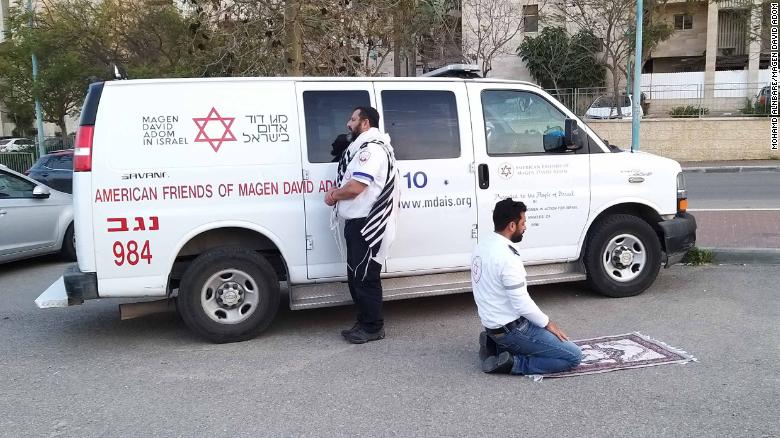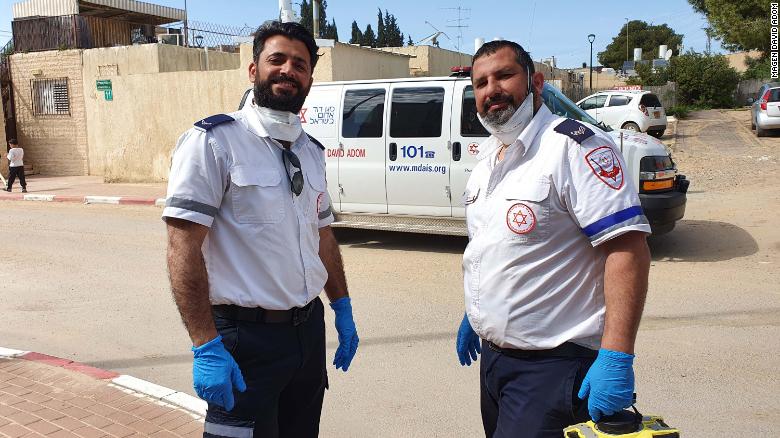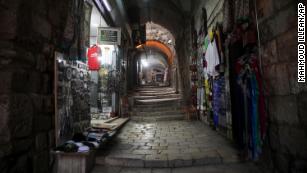Muslim and Jewish paramedics pause to pray together. One of many inspiring moments in the coronavirus crisis
By Oren Liebermann and Michael Schwartz, CNN March 26, 2020

Jewish paramedic Avraham Mintz faces Jerusalem, his prayer shawl hanging off his shoulders. Muslim paramedic Zoher Abu Jama kneels facing Mecca, his prayer rug unfurled before him.
Jerusalem (CNN)There was barely any time to pause.
Avraham Mintz and Zoher Abu Jama just finished responding to a call regarding a 41-year-old woman having respiratory problems in the southern Israeli city of Be'er Sheva.
Before that, they were checking on a 77-year-old man. There would be more calls ahead. Of that, there was no doubt.
As the clock neared six in the afternoon, Mintz and Abu Jama realized it may be their only break of the shift. The two members of Magen David Adom (MDA), Israel's emergency response service, paused to pray. Mintz, a religious Jew, stood facing Jerusalem, his white and black prayer shawl hanging off his shoulders. Abu Jama, an observant Muslim, knelt facing Mecca, his maroon and white prayer rug unfurled underneath him.
For the two paramedics, who routinely work together two or three times a week, the joint prayer was nothing new. For so many others, it was an inspiring image in the midst of the global coronavirus pandemic.
A picture of the two men snapped by a co-worker quickly went viral, garnering thousands of likes on social media and appearing in international media coverage. One user responded on Instagram: "I'm proud of all of the rescue services, it doesn't matter from what community or religion." On Twitter, another user said: "One fight! One victory! Let's unite."
"The fact that it is so simple makes it so powerful. I believe that Zoher and I and most of the world understand that we have to raise our heads and pray. That's all that's left," Mintz told CNN. A father of nine who lives in Be'er Sheva, the 42-year-old is a full-time MDA worker who trains volunteers.

For the colleagues, the joint prayer was nothing new. For others, it was an inspiring image.
Abu Jama, a father of seven from the nearby Bedouin city of Rahat, was one of those volunteers. He left his job as a driving instructor to help out as much as possible now. "In terms of belief and personality we believe in the same things and we have something in common," the 39-year-old told CNN. "I believe he is a person that gives and takes the feeling of honor and that is important."
Across Israel, MDA teams have fielded 100,000 calls on peak days, more than 10 times their normal volume, according to Zaki Heller, a MDA spokesman.

In addition to the normal work of paramedics and EMTs, MDA teams are responsible for getting coronavirus patients to hospital or to designated quarantine hotels, carrying out coronavirus tests, collecting blood donations and more. Earlier this month, they even staffed polling stations for those in self-quarantine.
MDA Director General Eli Bin beamed with pride when talking about his team, comprised of 2,500 full-time employees and 25,000 volunteers. "The people of MDA are facing the virus, looking it in the eye. The workers of MDA are working with their hands and their gloves and their masks," he told CNN. "We are the heroes of Israel."
If Mintz and Abu Jama see themselves as heroes, they certainly didn't let it show. They know their job, and they know their faith. "Everyone is afraid of the virus," said Mintz. "So are we, but we have the belief that everything is under the control of God, blessed be He. We both believe this."
Abu Jama echoes his partner. "I believe that God will help us and we will get through this. We should all pray to God to get us through this, and we will get through this world crisis."
The two prayed for about 15 minutes. Then it was back into the ambulance. And back to work.
No comments:
Post a Comment